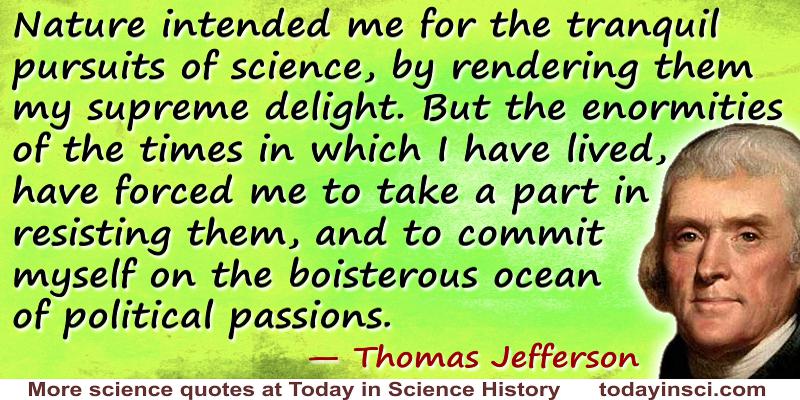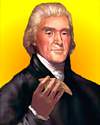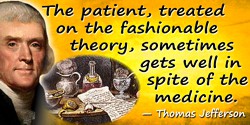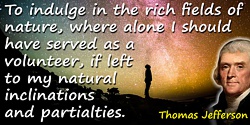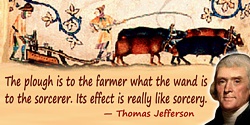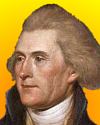 (source)
(source)
|
Thomas Jefferson
(13 Apr 1743 - 4 Jul 1826)
American statesman, astronomer, scholar and inventor who wrote the Declaration of Independence (1776) and organized the Lewis and Clark expedition (1803). His only full-length book, Notes on the State of Virginia contains an outline of the geography, flora and fauna of Virginia, and established his reputation as a scholar and a pioneering American scientist.
|
Thomas Jefferson
“Nature intended me for the tranquil pursuits of science”
Illustrated Quote - Large (800 x 400 px)
More Thomas Jefferson quotes on science >>
The fourth quadrennial U.S. presidential election was held from Friday, 31 Oct 1800 to Wednesday, 3 Dec 1800. Individual states scheduled elections at different times. The voting system of the times was flawed, and problematic, but the result was decided on 17 Feb 1801: Thomas Jefferson had defeated President John Adams (for whom he had served as Vice President) and became the nation’s third President. The campaign had been contentious and ugly, so he had the protection of a contingent of sword-bearing soldiers as he was escorted to his inauguration on 4 Mar 1801. Jefferson held the office for two terms, which ended on 4 Mar 1809.
Shortly before leaving the Washington, Jefferson wrote from there to Pierre Samuel Dupont de Nemours on 2 Mar 1809 about the embargo in place on exports from the U.S. With his retirement imminent, he mentioned his successor was to be James Madison. Jefferson was preparing to return to his Virginia estate and become, as he described to Dupont, “the hermit of Monticello.” This is how Jefferson described his feelings about leaving the White House:
“I am now leaving to be settled by my friend Mr. Madison. Within a few days I retire to my family, my books and farms; and having gained the harbor myself, I shall look on my friends still buffeting the storm, with anxiety indeed, but not with envy. Never did a prisoner, released from his chains, feel such relief as I shall on shaking off the shackles of power.
I thank God for the opportunity of retiring from them without censure, and carrying with me the most consoling proofs of public approbation.”
P.S. du Pont was a French political economist, public administrator, and reformer. He was one of the diplomats in the long negotiations (1783) after the American Revolution. In 1799, he moved his family to America and befriended Thomas Jefferson. Du Pont developed strong ties with industry and government. He helped his son Eleuthère Irénée du Pont, a chemist, establish a gunpowder mill on the Brandywine River near Wilmington, Delaware. This business thrived, and the E.I. du Pont de Nemours and Company became one of America’s most important scientific industries.
- Science Quotes by Thomas Jefferson.
- 13 Apr - short biography, births, deaths and events on date of Jefferson's birth.
- Jefferson As A Man Of Science - Preface to The Writings of Thomas Jefferson, Vol. 19.
- Thomas Jefferson on Education and Science from a report on establishing the University of Virginia (1818).
- Thomas Jefferson - context of quote “To indulge in the rich fields of nature” - Medium image (500 x 250 px)
- Thomas Jefferson - context of quote “To indulge in the rich fields of nature” - Large image (800 x 400 px)
- Thomas Jefferson - context of quote “The plough ... is really like sorcery” - Medium image (500 x 250 px)
- Thomas Jefferson - context of quote “The plough ... is really like sorcery” - Large image (800 x 400 px)
- Thomas Jefferson - context of quote “Chemistry … among the most useful of sciences” - Medium image (500 x 250 px)
- Thomas Jefferson - context of quote “Chemistry … among the most useful of sciences” - Large image (800 x 400 px)
- Thomas Jefferson - context of quote “The patient … sometimes gets well in spite of the medicine. ” - Medium image (500 x 250 px)
- Thomas Jefferson - context of quote “The patient … sometimes gets well in spite of the medicine. ” - Large image (800 x 400 px)
- Thomas Jefferson on Quack Medicine - from Letter to Dr. Caspar Wistar (1807)
- Thomas Jefferson - context of quote “Nature intended me for the tranquil pursuits of science” - Medium image (500 x 250 px)
- Thomas Jefferson - context of quote “The ocean ... like the air, is the common birthright of mankind” - Medium image (500 x 250 px)
- Thomas Jefferson - context of quote “The ocean ... like the air, is the common birthright of mankind” - Large image (800 x 400 px)
- Thomas Jefferson: Scientist, by Edwin Thomas Martin. - book suggestion.
